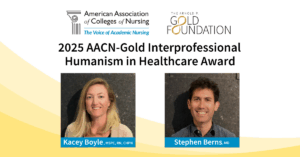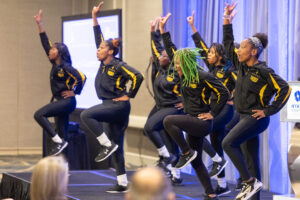Alan Alda begins his latest book in the midst of a conversation with the reader. His title “If I Understood You, Would I have this Look on my Face?” seems to be the response to a question you have just asked. Before you have time to argue that you’ve never even met him before, you begin to wonder: “Is he annoyed? Teasing me? Or perhaps he is posing an authentically curious question?”
You examine the cover image (a wonderful cartoon by Barry Blitt) to decipher his facial expression and body language. Alda greets you with an open visage with raised brows, a barely perceptible smile, facing palms at shoulder height simultaneously welcome you in and convey a sort of “who knows?” gesture. He has just made the point, reinforced in moving and delightful ways throughout the book, that communication is more than words, more than tone of voice, more than body language, always somewhat ambiguous, and something that a person cannot do alone.
In this marvelous book subtitled My Adventures in the Art and Science of Relating and Communicating, Alda co-creates for the willing reader a sense of intimacy, of kitchen table conversation (at the table of an incessantly curious, well-read and down-to-earth host). Like most excellent conversations, Alda’s book is not linear and is packed with stories. Many of the stories come from the extensive interviews he has done with scientists through his work as the host of Scientific American Frontiers and the Founder of the Alda Center for Communicating Science at Stony Brook University. But he brings you with him on other adventures as well.
You are with him in the chair of a defensive dentist, you cringe as he cuts his hand grappling with a hermetically sealed package (the product of poor communication between the marketing and sales divisions of a company), you walk with a young Alda selling mutual funds, most doors closing in his face until he realizes that sales are about figuring out what the other person is interested in. Day to day life, it seems, is packed with opportunities to observe, decipher and improve our relationships.
Alda humbly shares his own communication snafus – resulting in annoyed scientists and a bored grandson. He travels round and round the Kolb learning cycle – experiencing, reflecting, refining and taking what he learns back onto the conversational road. He shows us that relating is context dependent and requires the practical wisdom to know how best to communicate in this situation with these people.
Much of Alda’s book hinges on two concepts- Empathy and Theory of Mind. The former is the “feeling with” another human being which is necessary for authentic relating; the latter refers to our developmentally honed detective skills which enable us to discern what another person may be thinking and feeling by observing clues in body language, tone of voice, or particular word choice. He features Gold Foundation grant recipient Helen Riess’ work on the science and teaching of empathy. The works he cites are so varied and compelling that I wish he had included a reference list for further exploration.
Alda’s book implies that much of what we commonly do in medical education to teach communication skills could be done more effectively. Every medical student knows the feeling of being an imposter; wearing your starched white costume and reciting the script of a doctor and wondering if you will ever stop feeling like you’re acting. Who would have thought that one way to feel less like an actor is to do more of what real actors do?
Alda describes the way in which actors learn to relate through improvisational exercises. What would happen if we gave our students instructions to communicate bad news in gibberish so as to isolate our body language and tone of voice from our words, or to co-create a relational experience with a peer through mirroring each other’s motions? Most of the doctors I know view their bodies as a convenient vehicle to move their brains from place to place. Alda invites us into wholeness, to engage our entire bodies, all our senses. He asks that we take a close look at our use of technical language and ingrained habits of communication that may bind us to each other but separate us from patients and non-medical colleagues. Learning to communicate would be much easier if we didn’t need to unlearn so much!
And for you healthcare trainees and professionals who think “relating” is the icing on the cake of medical practice, Alda has news for you. It’s not the icing on the cake. It’s the cake!
 Elizabeth Gaufberg, MD, MPH is the Jean and Harvey Picker Director of the Arnold P. Gold Foundation Research Institute and an Associate Professor of Medicine and Psychiatry at Harvard Medical School.
Elizabeth Gaufberg, MD, MPH is the Jean and Harvey Picker Director of the Arnold P. Gold Foundation Research Institute and an Associate Professor of Medicine and Psychiatry at Harvard Medical School.


